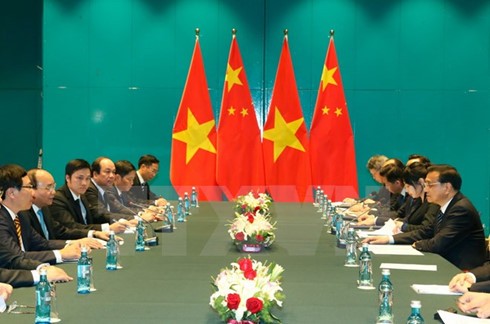(VOVworld) - The Vietnam News Agency has refuted untruthful reports by the Chinese press on the East Sea issues which were discussed at a meeting between Prime Minister Nguyen Xuan Phuc and Chinese Premier Li Keqiang on July 14
on the sidelines of the Asia-Europe Meeting (ASEM) Summit in Ulan Bator, Mongolia.
 |
| Prime Minister Nguyen Xuan Phuc held talks with Chinese Premier Li Keqiang on the sidelines of the Asia-Europe Meeting (ASEM) Summit in Ulan Bator, Mongolia. (Photo: VNA) |
Following that meeting, a number of official Chinese media agencies, including Xinhua, the English-language Chinadaily.com, and the Chinese-language version of the People’s Daily, quoted Prime Minister Phuc as saying that “Vietnam respects China’s stance on the East Sea arbitration case and stands ready to push forward bilateral maritime negotiations and properly manage differences with China, in order to contribute to regional peace and stability."
At the meeting, Phuc asked both sides to honor agreements by senior leaders, including the agreement on the basic principles guiding the settlement of issues at sea between Việt Nam and China signed by Party General Secretary Nguyen Phu Trong and his Chinese counterpart Hu Jintao in October, 2011. Phuc said such agreements will promote maritime negotiations, settle differences at sea, avoid further complicating the situation, fully and effectively realize the Declaration on the Conduct of Parties in the East Sea, and hasten the adoption of a Code of Conduct in the East Sea, contributing to regional peace and stability. He reiterated Vietnam’s stance on the ruling of the Permanent Court of Arbitration in The Hague last week in the Philippines’ lawsuit against China.
On July 12, Foreign Ministry spokesman Le Hai Binh said Vietnam welcomed the court’s final ruling, adding that Vietnam once again reiterates its consistent stance on this lawsuit as was clearly shown in the Vietnamese Foreign Ministry’s Declaration of December 5, 2014, sent to the PCA. Vietnam strongly supports the peaceful settlement of East Sea disputes through diplomatic and legal processes without the use or threat to use force, in accordance with international law, including the 1982 UN Convention on the Law of the Sea. It also supports maintaining peace and stability in the region; security, safety and freedom of navigation in and over the East Sea; and respecting the law governing seas and oceans.